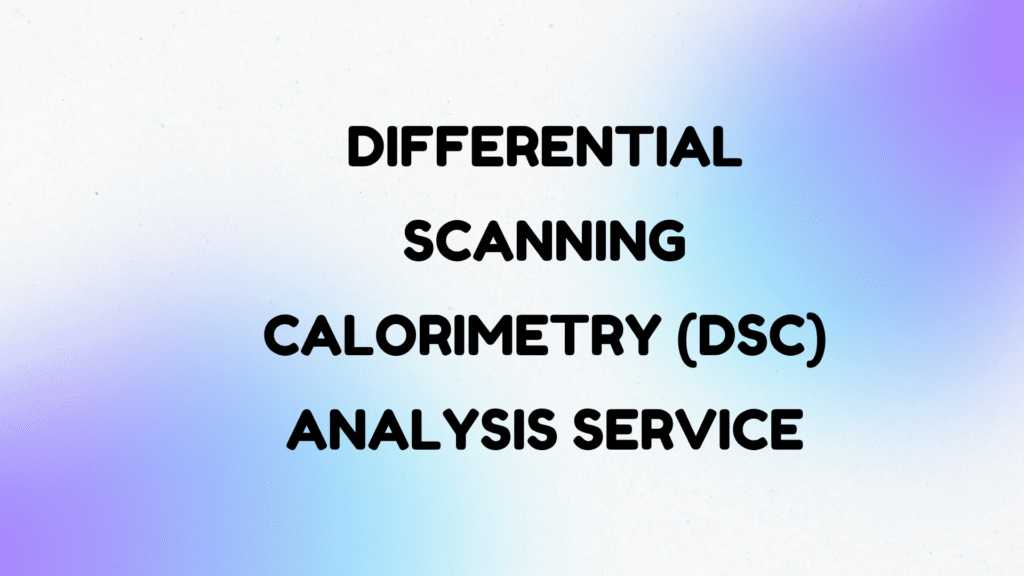.
.
.
Differential Scanning Calorimetry (DSC) Analysis Service

At ResolveMass Laboratories Inc., our Differential Scanning Calorimetry (DSC) Analysis Service provides precise thermal characterization of polymers, pharmaceuticals, composites, and advanced materials. Our scientists use state-of-the-art DSC instrumentation to measure transitions such as melting, crystallization, and glass transition with exceptional accuracy. Each analysis is performed under controlled conditions to deliver reproducible, publication-grade data trusted by researchers, manufacturers, and regulatory agencies.
What Is Differential Scanning Calorimetry (DSC)?
Differential Scanning Calorimetry (DSC) is a thermoanalytical technique used to measure the energy absorbed or released by a material as it undergoes temperature changes. It helps identify phase transitions such as melting points, crystallization behavior, and glass transition temperatures (Tg).
At ResolveMass Laboratories, we utilize high-sensitivity DSC instruments capable of detecting subtle thermal events in both crystalline and amorphous systems. This makes DSC a crucial analytical method for polymer development, pharmaceutical formulation, and materials research.
For related testing methods, explore:
- Glass Transition Temperature (Tg) Testing
- Melting Point Determination
- Crystallinity Analysis
- Polymorphic Transition Analysis
Our DSC Capabilities
Key Analytical Parameters Measured:
- Melting and crystallization temperatures
- Glass transition temperature (Tg)
- Heat capacity (Cp)
- Crystallinity percentage
- Oxidative stability and thermal degradation
- Curing kinetics and reaction enthalpy
Our scientists have extensive experience analyzing diverse materials including thermoplastics, biopolymers, pharmaceuticals, food matrices, coatings, and composites. We tailor DSC methods based on client needs — from rapid screening to detailed kinetic modeling — ensuring reliable, data-driven insights for product optimization and quality assurance.
Why Choose ResolveMass Laboratories Inc.?
ResolveMass Laboratories Inc. is a trusted Canadian analytical partner providing accurate and traceable results. Our team consists of materials scientists, chemists, and thermal analysis specialists with deep experience. Every DSC analysis undergoes rigorous quality checks and is supported by detailed thermograms and interpretive reports.
Our reputation for scientific precision and transparent reporting has made us a preferred partner for R&D laboratories and manufacturers across North America.
Applications of DSC Analysis
- Polymer quality control and batch comparison
- Pharmaceutical stability and polymorph identification
- Composites and coating formulation optimization
- Determination of purity and thermal degradation
- Research and academic material characterization
Request a DSC Analysis or Consultation
Our team is ready to assist you with expert consultation and precise DSC testing. Whether you’re validating a formulation or exploring new materials, we deliver data with scientific integrity and rapid turnaround times.
Frequently Asked Questions (FAQs)
Differential Scanning Calorimetry (DSC) measures how a material absorbs or releases heat when exposed to temperature changes. This technique identifies key thermal events such as melting, crystallization, and glass transition. It helps scientists understand material behavior, purity, and stability during processing or storage.
DSC records changes in heat flow, while TGA measures changes in mass as a sample is heated. In simple terms, DSC explains how energy interacts with a material, and TGA shows what portion of the material is lost or decomposed. When used together, they provide a complete picture of thermal stability and composition.
Typically, 5–10 milligrams of material is sufficient for accurate DSC results. The sample is placed in a sealed pan and analyzed under a controlled heating program. Our laboratory uses precision instruments that detect even subtle heat flow variations in small samples.
ResolveMass Laboratories operates advanced heat-flux and power-compensated DSC instruments, calibrated with certified reference materials. These instruments provide excellent baseline stability and sensitivity. Our calibration and quality control protocols ensure reproducible, traceable results for every analysis.
Yes. By analyzing the melting behavior and associated heat flow, DSC can estimate the purity of crystalline substances. Impurities cause shifts in melting temperature and enthalpy, which can be quantified to assess material quality—especially useful in pharmaceutical and chemical research.
Conclusion
The Differential Scanning Calorimetry (DSC) Analysis Service at ResolveMass Laboratories Inc. is built on scientific excellence, precision instrumentation, and deep material understanding. From polymers to pharmaceuticals, our data-driven insights empower clients to develop reliable, high-performing products with confidence.
Contact Us Today → https://resolvemass.ca/contact/
References
- King, M. B., & Putzova, S. (2010). Thermal analysis of pharmaceutical solids: a review of DSC applications. Journal of Thermal Analysis and Calorimetry, 103(1), 1–18. https://doi.org/10.1007/s10973-010-0477-6
- Kuril, A. K. (2024). Differential Scanning Calorimetry: A Powerful and Versatile Tool for Analyzing Proteins and Peptides. Journal of Pharmaceutical Research International, 36(7), 179–187. https://doi.org/10.9734/jpri/2024/v36i77549
- Zheng, Q. J., Zhang, Y. F., Montazerian, M., Gulbiten, O., Mauro, J. C., Zanotto, E. D., & Yue, Y. (2019). Understanding Glass through Differential Scanning Calorimetry. Chemical Reviews, 119(13), 7848-7939. https://doi.org/10.1021/acs.chemrev.8b00510